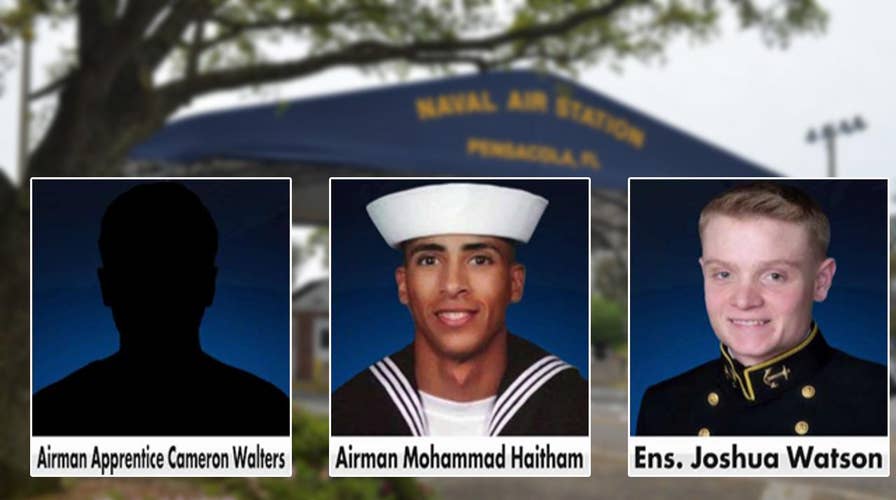Navy IDs 3 victims of NAS Pensacola shooting; military calls for increased security checks
Retired Lieutenant Colonel Donald Arias discusses heroism in the Naval Air Base shooting.
The shooting at Naval Air Station Pensacola shows we need a serious look at the vetting procedures for foreign nationals coming to the U.S. for military training.
Second Lt. Mohammed Saeed Alshamrani from Saudi Arabia killed three and wounded eight in the attack. His social media post blames our policies and his hatred of this country. How did someone with these beliefs make it through screening in Saudi Arabia and here in the U.S.?
Alshamrani was angry about the move of the U.S. Embassy to Jerusalem among other things. “For how long can the US survive this war of attrition?” he posted on Twitter. “You will not be safe until we live it as a reality in [Palestine], and American troops get out of our lands.”
NEWT GINGRICH: PEARL HARBOR AND 9/11 WERE HORRIFIC SURPRISE ATTACKS – HOW CAN WE PREVENT NEW ONES?
We must now determine if he acted alone or as part of a larger conspiracy. It is highly unlikely this act involved any support from the Crown Prince Mohammed bin Salman or other Saudi leadership. They are very tightly allied with President Trump in the fight against Islamists like Alshamrani and have taken considerable heat and danger themselves from those who oppose this move toward moderate Islam.
CLICK HERE TO SIGN UP FOR OUR OPINION NEWSLETTER
It makes zero sense for the crown prince and his supporters to destroy this partnership and trust by having anything to do with an incident like this. The likely scenario is Alshamrani, either alone or encouraged by others, was determined to undermine this new direction and alliance by committing this horrific attack against U.S. military personnel.
More from Opinion
With American troops dead on our own soil, we must look at the decisions that got us here and also what changes we should make to avoid it happening again. I have seen many question the wisdom of training foreign military personnel here and while it is fair to bring that up, I don’t believe the answer is to stop.
There are currently 5,181 foreign students from 153 countries in these programs, according to the Pentagon. We gain considerable value from both the training these students receive and the goodwill toward the U.S. they propagate upon their return home. They are better allies and more capable of inter-operating with U.S. forces after completing their training.
Unfortunately, some of these countries have elements within them that oppose alliance with the U.S. and, as the Pensacola incident shows, they can be a danger.
Military-to-military cooperation is not done just for national security reasons; it offers another avenue for diplomacy and building stronger relationships with countries. But there are risks involved.
Turkey is another country that deserves a hard look due to the Islamist nature of its leader, President Recep Erdogan. He purged the Turkish military of most of its secular officers and replaced them with others who share his extremist views. Turkey remains a NATO ally and we continue to have significant interchange with them although we did halt their participation in the F-35 program after they purchased Russian anti-aircraft systems.
Military-to-military cooperation is not done just for national security reasons; it offers another avenue for diplomacy and building stronger relationships with countries. This includes allies, friends and, in many cases, not quite friends. But there are risks involved in that and “green on blue” incidents where foreign troops kill U.S. forces are more common than any of us want. We must balance the value and risk of these programs and the likely outcome is we will still leave ourselves open to some of these in the interest of larger gains strategically.
It is horrifying to see our own troops die on a U.S. base right here at home. This shooting and others have prompted a look at the military policy of forbidding service members from carrying any weapons on post.
CLICK HERE TO GET THE FOX NEWS APP
When I was stationed at Fort Lewis, Wash., I was licensed to carry a concealed weapon anywhere in the state, except on base. This was absurd considering my level of training as a Special Forces weapons NCO and it is probably time to revisit this rule to ensure military bases aren’t gun-free zones where our troops are sitting ducks.
Military service is inherently dangerous and all who sign up are well aware of that. We must do all we can to minimize those risks consistent with still accomplishing their missions. Making sure we thoroughly vet and supervise all foreign troops we put in close proximity with our own service members must be an important piece of our security infrastructure.

